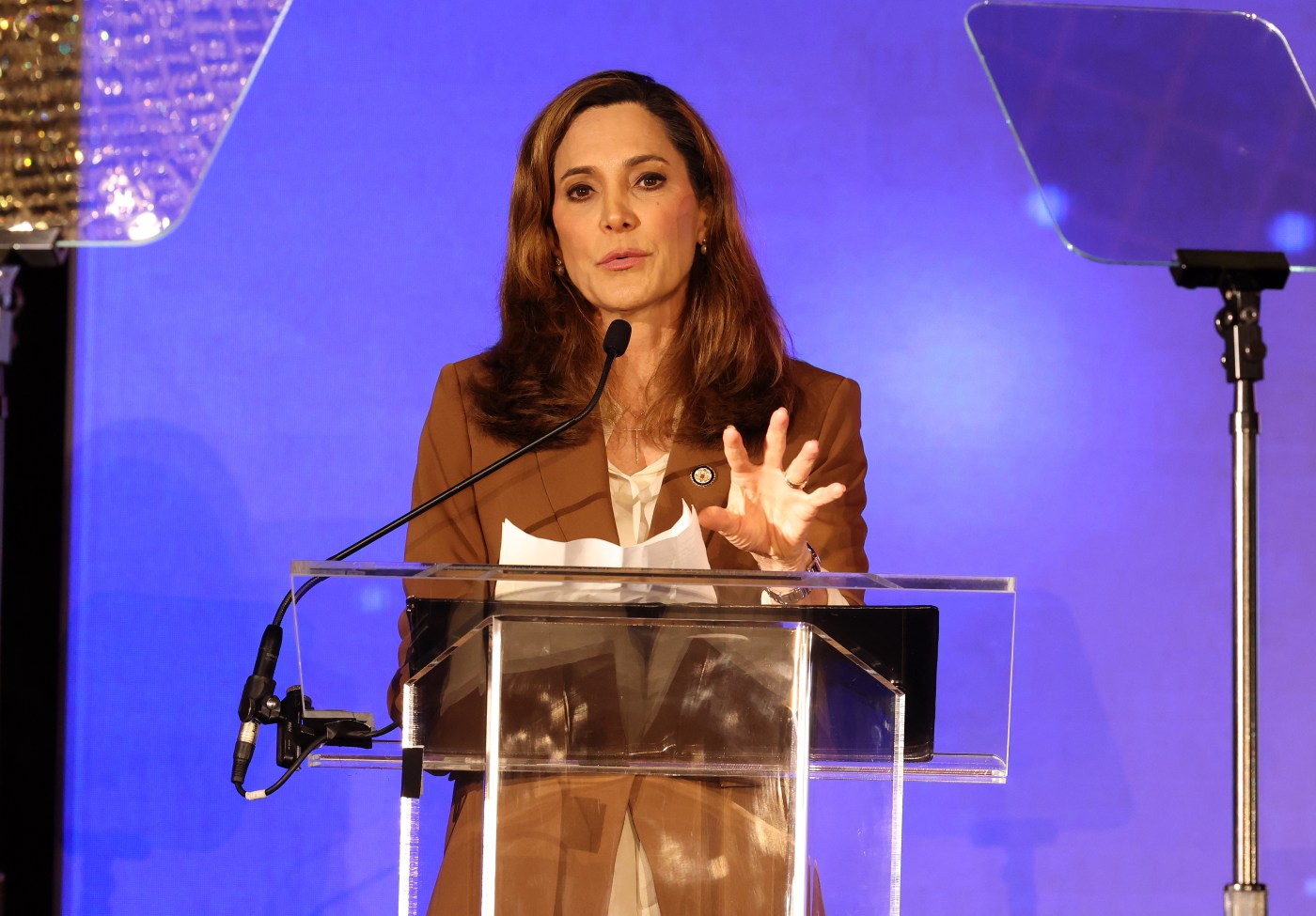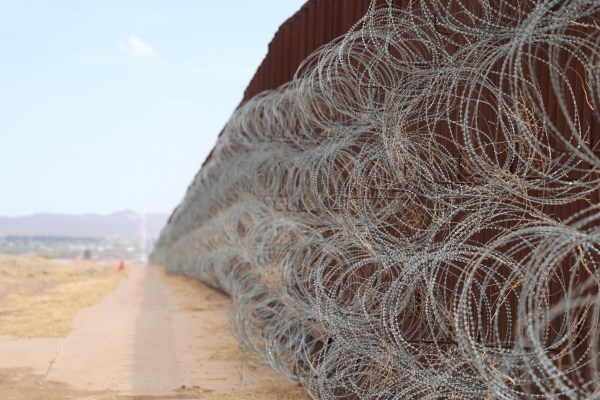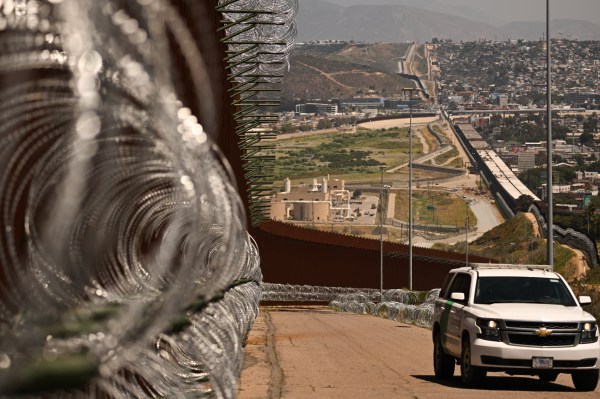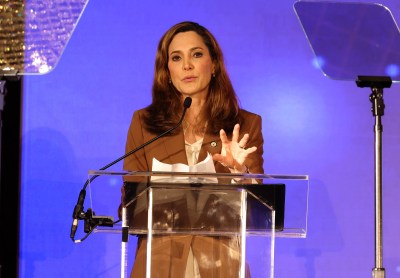One of President Donald Trump’s key campaign promises leading up to the 2024 election was to crack down on illegal immigration via mass deportations, so a bill that would allow many undocumented immigrants to stay in the country would seem to go against the current zeitgeist.
But this month, Republican Rep. María Elvira Salazar, a third-term congresswoman who represents part of Miami, introduced legislation that would tie border security and immigration enforcement measures to protections from deportation for certain immigrants who came to the U.S. unlawfully. The Dignity Act has backing from 10 additional Republicans and 11 Democrats.
The bill’s border security provisions include enhanced physical barriers along the southern border with Mexico, keeping individuals and families claiming asylum in federal custody while they await a decision on their claims, and making mandatory use of the government’s E-Verify system to check a potential employee’s immigration status.
It also would create basically two new classes of immigrants with legal status. First, people who crossed the border illegally as children and have remained in the U.S. can receive green cards provided they complete educational or work requirements plus pass a criminal background check. For others who arrived in the United States without authorization before 2021, the bill offers a path to longer-term legal residency. Those who choose to join the so-called “Dignity Program” would pay an initial fine, plus $7,000 over seven years, while not committing major crimes. Once those seven years are up, they could apply for “Dignity Status,” which would allow them to remain in the U.S. legally as long as they obey the country’s laws. The bill’s provisions would not give them citizenship or access to federal entitlement programs. Those who came in after January 1, 2021, just before President Joe Biden took office and presided over a record number of illegal border crossings, are not eligible and would be subject to deportation.
Salazar’s bill is the latest congressional attempt to comprehensively address the thorny issue of border security and immigration, something lawmakers on both sides of the aisle have struggled to do for decades. But the legislation is unlikely to gain much traction and will probably join a raft of other failed attempts at immigration reform. Still, it serves as a gauge of where the Republican Party is on immigration and helps explain how it got here.
Washington’s years-long failure to answer the questions of how to stop people from entering the U.S. illegally and what to do with undocumented people who are already here is a principal reason for the rise of Trump, who returned to the White House this year after pledging to deport many of the people the Dignity Act would protect.
But such efforts have created an environment of fear where enforcement actions have taken place, leading the overall goal to become less popular. Millions of illegal immigrants have been in the United States long enough to become key parts of their communities. Many are married to American citizens and have children who were born here. “You can start breaking down those cases and seeing that we might need to take a closer look at some of these cases, or else we're going to really do irreparable harm to our reputation as a country and irreparable harm to some of these communities that have depended on their work,” Lindsey Warburton, the government affairs manager for immigration at the centrist Niskanen Center think tank, told The Dispatch.
That’s not to mention the economic consequences of mass deportations, which Salazar has used as her chief argument for the bill. “I believe that it's going to be very difficult to deport 10-plus million people, people who are needed in the economy in three main sectors,” Salazar told The Dispatch in an interview. “So I think a Solomonic way, the most practical way, is to bring them out of the shadows and give them the Dignity Status.”
Vital parts of the economy employ a hefty number of illegal immigrants, and deporting them all would likely lead to labor shortages. For example, people without legal work authorizations made up as much as 42 percent of hired farmworkers in 2022, according to the Department of Agriculture, and potential effects on farmers have led Trump to waver on targeting that industry for immigration enforcement. At an event in Iowa earlier this month, he signaled that he would go soft on some agricultural employees “if a farmer’s willing to vouch for these people.” But days later, Agriculture Secretary Brooke Rollins insisted there would be “no amnesty” for such workers and articulated a goal of “a 100 percent American workforce.”
Still, the bill’s proponents have insisted that Trump does not desire to deport all people who are not authorized to be in the country. Days after the Dignity Act’s introduction, Rep. Marlin Stutzman of Indiana, a Republican co-sponsor, tweeted his support for the bill, along with a clip of Trump’s comments in Iowa.
For her part, Salazar gave a rather loose interpretation of Trump’s campaign promises and maintained that her bill is not in conflict with the administration’s aims. “He promised that he was going to be deporting the ‘bad hombres’ and those who are gang members and those people who came in and do have a criminal record—and specifically those who came in under Biden,” she said.
The Dignity Act has long odds of passing through Congress. The ultimate test is whether Trump would sign it. He has not made a specific pronouncement on it, but White House Press Secretary Karoline Leavitt did not speak favorably about the bill in response to a question last week.
Rep. Jim Jordan, who chairs the House Judiciary Committee that has jurisdiction over the bill, told The Dispatch his panel was more focused on revamping legislation that only includes border security provisions such as E-Verify, more barriers, and restrictions on asylum claims. Such a bill passed the House last Congress but did not receive consideration in the Democratic-majority Senate.
But the larger obstacles to Salazar’s bill are both philosophical and political.
Voices in the Republican Party who want few or no illegal immigrants in the country are louder than ever. “If you came into the country illegally, you inherently violated our laws, and you're subject to deportation,” Rep. Brandon Gill of Texas, who serves as the president of the House’s freshman class, told The Dispatch. He added that people brought into the U.S. illegally by family members as children—so-called “Dreamers,” named after failed legislation known as the DREAM Act—should also face deportation.
But Trump has also moved the center of the Republican Party to the right on immigration. Where the GOP might have previously countenanced a bill that at least allowed “Dreamers” to stay—as it did with Trump’s support in 2018—there appears to be little appetite for such a measure that would protect even more people from deportation. “I don’t see that going anywhere any time soon,” Sen. Lindsey Graham of South Carolina said of the Dignity Act. “Secure the border, deport people, then you can talk about that other stuff.” Graham is the last remaining Republican senator who was part of the “Gang of Eight,” a group of four Republican and four Democratic senators who in 2013 proposed an immigration fix that included border security provisions, plus a pathway to citizenship for certain illegal immigrants.
That bill passed the Senate but went nowhere in the House. It fell victim to another difficulty that the Dignity Act faces: Republicans don’t trust that the legislation would be enforced.
In 1986, President Ronald Reagan signed the Immigration Reform and Control Act, which, like Dignity and the Gang of Eight bill, coupled protection from deportation with border security. But it did not live up to its promises on enforcement. That legislation has “poisoned the immigration debate ever since because the people who got the amnesty got their amnesty, and the promised enforcement against employers and prohibition on employing illegal immigrants was never enforced,” Mark Krikorian, head of the restrictionist Center for Immigration Studies, told The Dispatch.
Republicans, especially now, are more insistent on putting enforcement first. “I think we're going to have to get a secure border, improve it, before we move on to anything else,” said Sen. James Lankford of Oklahoma, who was the lead Republican author of a bipartisan border security bill that failed in Congress last year.
Salazar insisted that now is the right time for her legislation, arguing that Trump’s executive actions coupled with big spending on border funding in the One Big Beautiful Bill Act have effectively stopped the flow of illegal immigration. “The border is secured with the BBB, and you just have to look at the numbers in the past month, so no one else is coming in illegally,” she said. “So what are we going to do with those who have been here for a long time?”
The rhetorical question gets to the last difficulty. Although a previous version of the bill included a broader path to citizenship, Salazar has emphasized that the current iteration does not give citizenship to those in the Dignity Program, just protection from deportation. But some on the right worry that this bill could be the first step toward instituting a path to citizenship. Thus far, the Dignity Act’s proponents have not assuaged that fear.
Right-wing opponents have circulated a clip of Salazar discussing the bill with a local news station. “At some point in the future, another legislator will write another law to give them a path to citizenship,” she says. “Right now what we need to do is buy peace for these people, allow them to stay, to continue working because they are needed.”
“It's kind of saying the quiet part out loud,” Krikorian said of her comments.
Salazar says the clip is taken out of context. Her answer was in response to a question about asylum seekers or people with temporary protected status, who are in the country legally, at least for the moment. But in an interview with The Dispatch, Salazar did not give a clear answer to repeated questions about whether she supported citizenship for those who would be in the Dignity Program.
“I cannot tell you how I would vote on future legislation,” she said. “That would be irresponsible.”
Democrats who support the bill have not helped her on the citizenship question. Rep. Veronica Escobar of Texas, the lead Democrat on the legislation, said it was “futile” to predict what a future Congress might do but said she would “of course” support a pathway to citizenship for those protected from deportation under the Dignity Act.
“I think it's advantageous to the United States to have a robust American workforce paying into Social Security, paying into Medicare, paying into our tax system, helping grow our economy,” she told The Dispatch. “But that's a moot point because the bill we have in front of us today does not include that.”
Rep. Hillary Scholten of Michigan, another Democratic co-sponsor of the bill, was also supportive of citizenship. “It's what we had in the first version, and I think, ultimately, that is the direction that we want to go,” she told The Dispatch, adding that this month’s bill is a “first, very necessary step.”







Please note that we at The Dispatch hold ourselves, our work, and our commenters to a higher standard than other places on the internet. We welcome comments that foster genuine debate or discussion—including comments critical of us or our work—but responses that include ad hominem attacks on fellow Dispatch members or are intended to stoke fear and anger may be moderated.
With your membership, you only have the ability to comment on The Morning Dispatch articles. Consider upgrading to join the conversation everywhere.